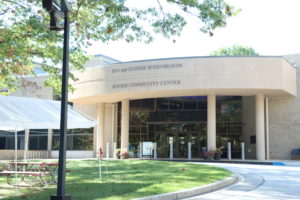
The Rosenbloom Owings Mills JCC partnered with the Red Cross on Oct. 20 to help address a national shortage of blood through a blood drive organized at its facility.
“The Red Cross national blood inventory is the lowest it’s been at this time of year in at least six years, with less than a day’s supply of certain blood types in recent weeks,” said Ashley Henyan, the communications director for the Red Cross in Washington, D.C., Baltimore and Wilmington, Del., in an email. “Donor turnout has reached the lowest levels of the year as many delayed giving amid a return to the workplace and in-person learning for many families, as well as the recent surge in COVID-19 cases across the country due to the delta variant.”
In response, the Red Cross has been working nonstop to help hospitals and patients with their blood needs, Henyan said. They planned for a total of 10 blood drives at the Rosenbloom Owings Mills JCC over the course of the year, with the Oct. 20 drive being the eighth held so far. The final two drives are currently scheduled for Nov. 23 and Dec. 20.
The Red Cross has had a partnership with the JCC of Greater Baltimore for decades, Henyan said, and commonly relies on partner organizations to host blood drives and recruit donors.
“On behalf of the patients we serve, the Red Cross is thrilled to partner with the JCC to collect [life] saving blood,” Henyan said.
The Red Cross provides 40% of the country’s blood, Henyan said, with a national network that first meets the needs of local hospitals before moving blood to where it is most needed. For example, the Red Cross provides blood products to around 50 local hospitals in the nation’s capital and in the Greater Chesapeake region.
On the challenges that come these days with convincing Americans to give blood, Henyan highlighted the concerns potential donors have regarding safety. She hopes to reassure people “that blood drives have the highest standards of safety and infection control,” while emphasizing that the Department of Homeland Security and other authorities have classified blood donation as an “essential service” and “critical infrastructure.”

“It’s a necessary thing,” said John Steele, a resident of Eldersburg who came out to donate at the blood drive on Oct. 20. “If we don’t do it, then where’s the blood going to come from, you know, for people that are in trauma?”
Steele also noted that he is constantly getting texts and emails from the Red Cross, which provided more than a few reminders.
Steele estimated that he typically donates blood at least a few times a year.
Beth Speert, a resident of Reisterstown who also came to donate blood at the drive, said she has been giving blood for more than 20 years.
“I’ve been giving blood ever since my children were in preschool at Beth El [Congregation of Baltimore],” she said.
Asked why she donates blood, Speert noted how it is easy to do, costs her nothing but her time and that her O-negative blood type makes her a universal donor, making it all the more important that she donate.
“Donating blood is a quick and easy way to help save lives,” Henyan said. “Blood cannot be manufactured — it can only come from compassionate donors.
“You might be helping an accident victim, a mother experiencing a complicated childbirth or a cancer patient,” Henyan continued. “You might even be helping someone you know.”
Henyan urged those eligible to donate at a future blood drive visit RedCrossBlood.org.







